
They all converge towards the need and will to develop more inclusive ECEC systems and settings. in the European Pillar of Social Rights, policy recommendations which have been adopted by EU Member States as well as research findings.

The Toolkit for inclusion in ECEC recalls political commitments made e.g. The 2020 Communication from the European Commission on achieving the European Education Area by 2025 announced the release of a European toolkit for inclusion in ECEC, drawing on exchange of best practice and the input of experts and stakeholders. The European Union 2019 Council Recommendation for High-Quality Early Childhood Education and Care Systems offers a Quality framework for ECEC to support Member States to work towards achieving higher quality and more inclusive ECEC systems. It helps them develop to the best of their abilities and supports their well-being. All children must therefore be able to benefit from high quality ECEC, independently from their individual or family circumstances. children living in poverty or precarious conditions, children with disabilities or special learning needs, or children from a migrant background or from a minority ethnic community.

While it benefits all children, it is even more crucial to children who may face additional needs or difficulties due to individual or family circumstances, e.g.
#Pdf toolkit plus professional#
It provides young children with professional support to grow, learn and flourish. Early childhood education and care (ECEC) is the first step on the lifelong learning ladder.


 0 kommentar(er)
0 kommentar(er)
